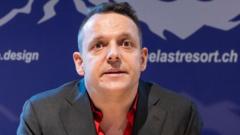As Irene Mekel grapples with her Alzheimer's diagnosis, she faces a painful dilemma about her own mortality. Living comfortably in her seaside village of Castricum, the former nurse is still active and engaged, yet she acknowledges the inevitable decline of her mental faculties. Despite the love and support of her three children, Irene yearns to avoid the confines of a nursing home, which she views as a loss of dignity.
Recognizing her right as a Dutch citizen, she has pursued medically assisted death, enlisting in a workshop that guided her to draft an advance directive outlining her wishes for euthanasia. However, her family doctor, despite expressing understanding, has refused to fulfill her request at a time when Irene’s cognitive rights could be compromised.
With a sense of urgency, Irene reflects on her future and the sheer tragedy of losing her autonomy. As she navigates these heart-wrenching decisions, her story exemplifies the complex legal and ethical landscape surrounding assisted dying for individuals with diminished capacity in the Netherlands, stirring conversation around the morality of choice in the face of progressive health decline.
Recognizing her right as a Dutch citizen, she has pursued medically assisted death, enlisting in a workshop that guided her to draft an advance directive outlining her wishes for euthanasia. However, her family doctor, despite expressing understanding, has refused to fulfill her request at a time when Irene’s cognitive rights could be compromised.
With a sense of urgency, Irene reflects on her future and the sheer tragedy of losing her autonomy. As she navigates these heart-wrenching decisions, her story exemplifies the complex legal and ethical landscape surrounding assisted dying for individuals with diminished capacity in the Netherlands, stirring conversation around the morality of choice in the face of progressive health decline.



















